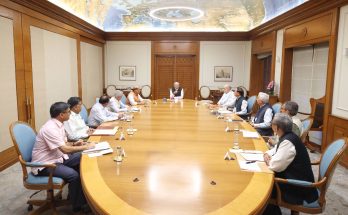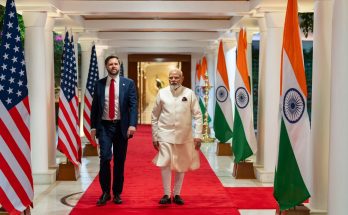
By Shweta Aggarwal
The coronavirus pandemic has triggered a geopolitical churning and intensified competition among global players to shape a mutating world order. On May 31, US President Donald Trump, in his vintage maverick style, responded to this growing impatience with the existing order of things by terming the G7 as a “very outdated group”, and proposed that the G7 be expanded to include India, Australia, South Korea and Russia in the grouping of the largest advanced economies.
In a conversation with journalists aboard his special aircraft Air Force One, President Trump suggested that the G7 should be expanded and rechristened as “G10 or G11”, and proposed that the grouping holds an in-person meeting of leaders in September or November in the US this year.

The G10/11 proposal has predictably generated intense debate in diplomatic and strategic circles about the rationale and viability of the new grouping which is still an idea in progress. Is G10/11 an opportunity to recast the world order and create a new multilateral body that can effectively address crises and challenges of the post-Covid world? Responding to President Trump’s G11 proposal in a telephonic conversation on June 2, India’s Prime Minister Narendra Modi commended him “for his creative and far-sighted approach, acknowledging the fact that such an expanded forum would be in keeping with the emerging realities of the post-COVID world.” Mr Modi underlined that India would be happy to work with the US and other countries to ensure the success of the proposed Summit.

Against this backdrop, India Writes Network, an emerging think tank and media-publishing platform focused on global affairs, has organised a Virtual Panel Discussion (webinar) on the theme: “From G7 to G11: Unscrambling post-Covid Geopolitical Alphabet,” on July 2 (6 pm IST). The webinar will explore the viability of expanding the G7 grouping to include emerging powers to reflect the ongoing shift in the global balance of power, which has been accelerated by the coronavirus pandemic. The webinar, which will be moderated by Manish Chand, Founder-CEO and Editor-in-Chief, India Writes Network and India and the World, features some of the iconic figures in the world of foreign policy and strategic thinking. The speakers at the webinar include: The Hon Barry O’Farrell, Australia’s High Commissioner to India; Amb. Kanwal Sibal, Former Foreign Secretary, India’s former Ambassador to France and Russia; Amb. Richard Verma Vice-Chair & Partner, The Asia Group, US former Ambassador to India; Amb. Anil Wadhwa: India’s former ambassador to Italy, Thailand and Oman; and Gautam Bambawale, India’s former ambassador to China, Pakistan & Bhutan.
India-Australia Connect

Australia’s High Commissioner to India The Hon Barry O’Farrell is expected to present Canberra’s perspective on G11 and how such a grouping fits in with the country’s larger foreign policy and strategic calculus. The Australian envoy is also expected to illuminate ways in which India and Australia can partner in G11 and other plurilateral and multilateral formations to shape the emerging world order. India-Australia relations scaled new heights during the first Virtual Summit between Prime Minister Narendra Modi and his Australian counterpart Scott Morrison on June 2, which elevated bilateral ties to the level of Comprehensive Strategic Partnership.
Unscrambling post-Covid Geopolitics

Richard Verma, a former US ambassador to India and Vice-Chair & Partner, The Asia Group, will join the webinar from New York and shares his views on the response of the American strategic community towards the G11 idea and how G11 can open new pathways of cooperation between India and the US in the multilateral arena.

Kanwal Sibal, a former foreign secretary of India and well-known commentator on foreign affairs, will seek to identify possible strategic gains for India by joining the G11 grouping at a time when the US and China are entangled in a new cold war.

With growing speculation about the future trajectory of the Quadrilateral Dialogue, Anil Wadhwa, a former ambassador of India to Thailand, Italy, Poland and Oman, will explore how the G11 can cohere with India’s notion of an inclusive Indo-Pacific.

With the impression gaining ground that President Trump has proposed G11 with the overarching aim of countering China, Gautam Bambawale, the Mandarin-speaking former Indian ambassador to China, will weigh in on the consequences of excluding China, the world’s second largest economy, from the G11 grouping.
The invitation by US President Donald Trump to India to attend the extended G7 meeting later this year and to include Asia’s third largest economy in the proposed G10/11 grouping underlined “a vote of confidence in India and its potential,” said Anil Wadhwa, a veteran diplomat who served as Secretary (East) in India’s Ministry of External Affairs, ahead of the conference.
Manish Chand underlined that the webinar will illuminate and clarify complex issues that underpin the idea of G10/G11 and how such a grouping, if it comes to fruition, can be shaped to address emergent challenges of the post-Covid world.
 “
“
“India, in particular, has a lot at stake in the G11 idea as the concept of such a grouping reflects New Delhi’s relentless advocacy of a reformed world order that reflects contemporary realities. The G11 concept is could also become a metaphor for sculpting an inclusive world order,” he said.
In many ways, the current G7, as argued by President Trump, looks like an anachronism as they now account for less than a third of global GDP on a purchasing power parity (PPP) basis, and less than half on market exchange rates (MER) basis, according to the 2017 report of the accountancy firm, PwC, “The World in 2050.” The G7 countries, when constituted, accounted for close to two-thirds of global GDP.
The seven largest emerging economies (E7, or “Emerging 7”), comprising Brazil, China, India, Indonesia, Mexico, Russia and Turkey, account for over a third of global GDP on purchasing power parity (PPP) terms, and over a quarter on MER basis.
According to the PwC Report, by 2050 six of the seven of the world’s best performing economies will be China, India, the United States, Indonesia, Brazil, and Russia.
EVENT DETAILS:
Theme: From G7 to G11: Unscrambling post-COVID Geopolitical Alphabet
July 2, 2020 | 6pm -7.30 pm IST (UTC +05:30)/ 8.30 a.m. to 10 a.m. EST
Speakers
H.E. The Hon Barry O’Farrell, Australia’s High Commissioner to India
Amb. Kanwal Sibal, Former Foreign Secretary, India’s former Ambassador to France and Russia
Amb. Richard Verma Vice-Chair & Partner, The Asia Group, US former Ambassador to India
Amb. Anil Wadhwa: India’s former ambassador to Italy, Thailand and Oman
Gautam Bambawale, India’s former ambassador to China, Pakistan & Bhutan
Moderator: Manish Chand, CEO & Editor-in-Chief, India Writes Network
REGISTRATION: FROM G7 TO G11 WEBINAR
https://us02web.zoom.us/webinar/register/WN__8lNzamRR1qIeH-pHa0aYA
Note to participants/registrants: To submit a question for the event, please email editor@indiawrites.org, indiawritesgroup@gmail.com. Participants may also submit their questions through the Q&A box in the Zoom webinar or the comments section on our YouTube livestream.
G11-webinar-speakers-profilesAuthor Profile
- India Writes Network (www.indiawrites.org) is an emerging think tank and a media-publishing company focused on international affairs & the India Story. Centre for Global India Insights is the research arm of India Writes Network. To subscribe to India and the World, write to editor@indiawrites.org. A venture of TGII Media Private Limited, a leading media, publishing and consultancy company, IWN has carved a niche for balanced and exhaustive reporting and analysis of international affairs. Eminent personalities, politicians, diplomats, authors, strategy gurus and news-makers have contributed to India Writes Network, as also “India and the World,” a magazine focused on global affairs.
Latest entries
 India and the WorldApril 23, 2025Kashmir terror: India hits back at Pakistan, highlights cross-border linkages
India and the WorldApril 23, 2025Kashmir terror: India hits back at Pakistan, highlights cross-border linkages India and the WorldApril 23, 2025The Century of America and India: Growing Together
India and the WorldApril 23, 2025The Century of America and India: Growing Together In ConversationApril 20, 2025India Can Contribute Largely to Development of Morocco’s Defence Industry: Ambassador
In ConversationApril 20, 2025India Can Contribute Largely to Development of Morocco’s Defence Industry: Ambassador India and the WorldApril 2, 2025Mapping Next Steps for BIMSTEC
India and the WorldApril 2, 2025Mapping Next Steps for BIMSTEC







